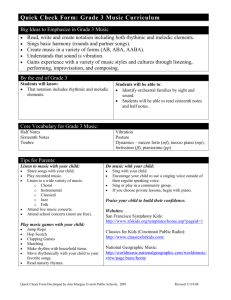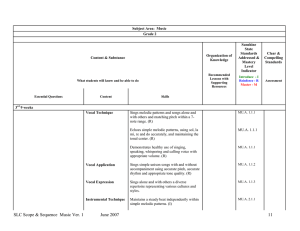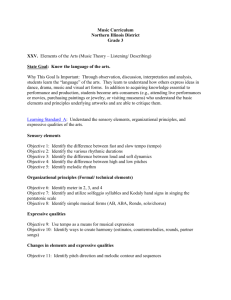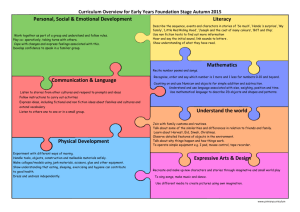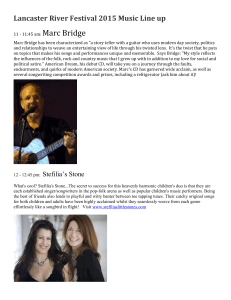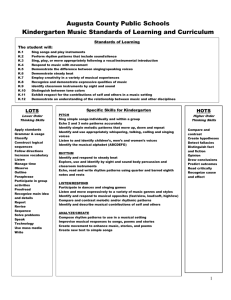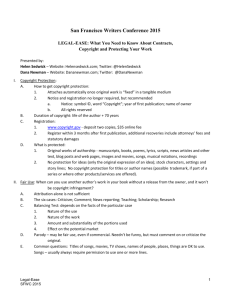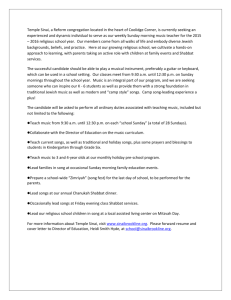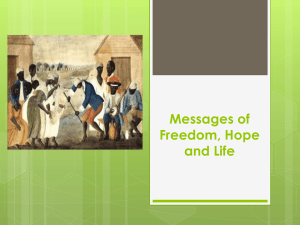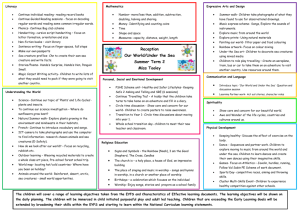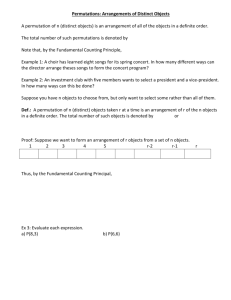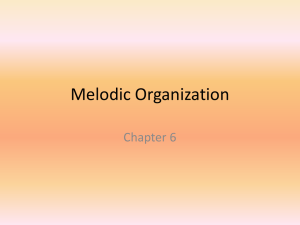Music - Nova Classical Academy
advertisement
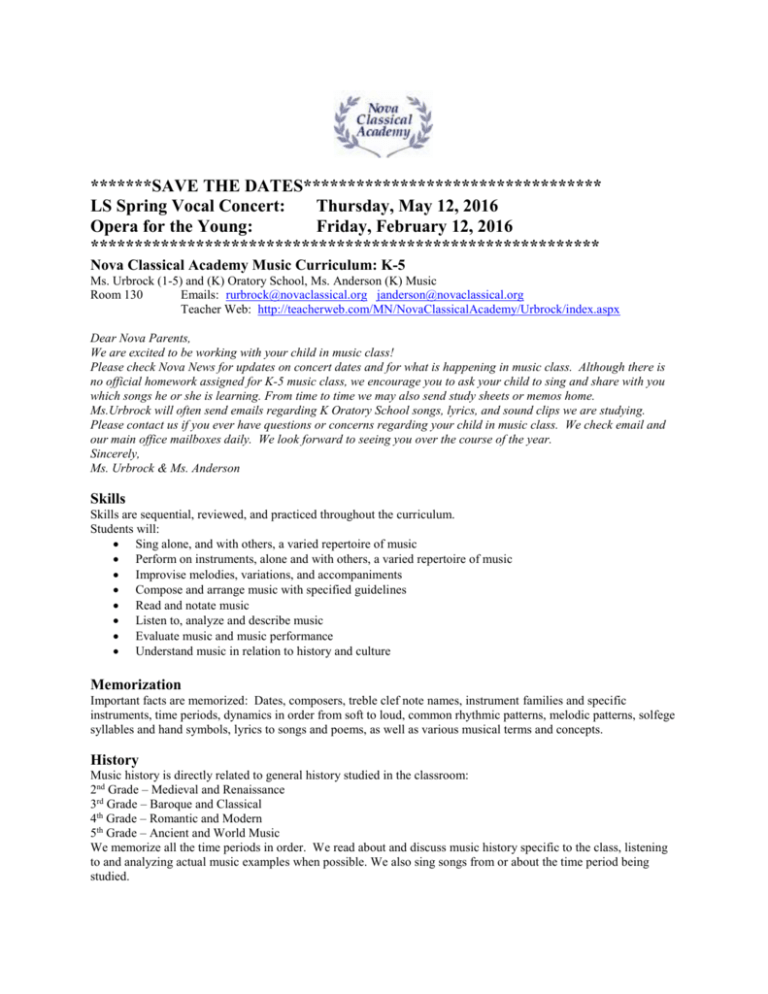
*******SAVE THE DATES********************************** LS Spring Vocal Concert: Thursday, May 12, 2016 Opera for the Young: Friday, February 12, 2016 ********************************************************** Nova Classical Academy Music Curriculum: K-5 Ms. Urbrock (1-5) and (K) Oratory School, Ms. Anderson (K) Music Room 130 Emails: rurbrock@novaclassical.org janderson@novaclassical.org Teacher Web: http://teacherweb.com/MN/NovaClassicalAcademy/Urbrock/index.aspx Dear Nova Parents, We are excited to be working with your child in music class! Please check Nova News for updates on concert dates and for what is happening in music class. Although there is no official homework assigned for K-5 music class, we encourage you to ask your child to sing and share with you which songs he or she is learning. From time to time we may also send study sheets or memos home. Ms.Urbrock will often send emails regarding K Oratory School songs, lyrics, and sound clips we are studying. Please contact us if you ever have questions or concerns regarding your child in music class. We check email and our main office mailboxes daily. We look forward to seeing you over the course of the year. Sincerely, Ms. Urbrock & Ms. Anderson Skills Skills are sequential, reviewed, and practiced throughout the curriculum. Students will: Sing alone, and with others, a varied repertoire of music Perform on instruments, alone and with others, a varied repertoire of music Improvise melodies, variations, and accompaniments Compose and arrange music with specified guidelines Read and notate music Listen to, analyze and describe music Evaluate music and music performance Understand music in relation to history and culture Memorization Important facts are memorized: Dates, composers, treble clef note names, instrument families and specific instruments, time periods, dynamics in order from soft to loud, common rhythmic patterns, melodic patterns, solfege syllables and hand symbols, lyrics to songs and poems, as well as various musical terms and concepts. History Music history is directly related to general history studied in the classroom: 2nd Grade – Medieval and Renaissance 3rd Grade – Baroque and Classical 4th Grade – Romantic and Modern 5th Grade – Ancient and World Music We memorize all the time periods in order. We read about and discuss music history specific to the class, listening to and analyzing actual music examples when possible. We also sing songs from or about the time period being studied. Kindergarten Oratory School At Nova, we want all students to learn how to be good Speakers and Listeners. Students learn these skills not just for school, but for life. “Non Scholae sed Vitae Discimus” Students will learn “Orator 5” and “Listener 5” chants. We will further practice our Oratory skills through chants, songs, and memorization, focusing on a World theme. Students will be given the chance to stand at a podium, while the rest of the class is the audience. I will be individually assessing each student on his/her Oratory (speaking/listening) and memorization skills. I will post all the words to the songs and assessment rubrics on my Teacher Web. Please visit my website and click on the Kindergarten Icons to view and practice the songs with your child. http://teacherweb.com/MN/NovaClassicalAcademy/Urbrock/index.aspx The K-5 music program incorporates: Grammar Stage Reciting, chanting, memorizing Singing songs, jingles Dancing and movement Playing educational games Using visuals, manipulatives and hand symbols Learning bits about composers and instruments of the orchestra Logic Stage Integrated subject matter/links between areas of study; understanding music in relation to history and culture Application of musical knowledge (play recorder, sing harmony, read and notate music, compose, improvise) Performance and critique Comparing and contrasting musical performances (same piece/different conductors, for example) Written exercises Main Textbook: “Share the Music Series” by MacMillan/McGraw-Hill Included in this text: A sequenced approach to melodic, rhythmic, and essential skills Curriculum integration Use of different learning styles Informal and formal assessment tools Resource masters (worksheets and manipulatives) Orff (xylophone) arrangements for songs Recorder arrangements for songs Singing, movement, instruments, exploration activities through improvisation Composition Supplemented with: “The Story of Music” published by Usborne “The Story of the Orchestra” by Robert Levine Related lesson plans using Orff, Kodaly, and Dalcroze methods Grades 4 & 5: “My Recorder Book!” published by Feldstein Instrument demonstrations, guests, field trips, Opera for the Young Classroom CD library Curriculum Essentials: Skills and Concepts Kindergarten Melodic Vocal Exploration 4 Voices: Speaking, Singing, Calling, Whispering Tone Color and Inflection (Solfege sol-mi incorporated in many songs) High/Low Rhythmic Steady Beat Long/Short Fast/Slow Essentials Traveling through shared space (movement/ music as time and space) Instrument Families: Percussion, Woodwind, Brass, Strings, and Keyboard 1st Grade Melodic Vocal Exploration 4 Voices: Speaking, Singing, Calling, Whispering Tone Color and Inflection (Solfege sol-mi incorporated in many songs) High/Low Rhythmic Steady Beat Long/Short Fast/Slow Essentials Ancient Music History: Harps The Music Staff, lines and spaces Style (March or Lullaby) Form Percussion Families: Woods, Shakers/Scrapers, Metals, Drums 2nd Grade Melodic Vocal Registers Singing in Tune Vocal Warm-ups Rhythmic Half note (Ta-o) Beat vs. Rhythm Tempo (speed) Essentials Medieval and Renaissance Music History Dynamics (pp through ff, crescendo and diminuendo) 3rd Grade Melodic Pitch and melodic direction (melodic contour) Rhythmic Beat vs. Rhythm Dictation (identify and write a heard rhythm) Essentials Baroque and Classical Music History The Orchestra 4th Grade Melodic Melodic steps, skips, and repeats Treble clef notes Middle C to high F Question and Answer improvisation Partner Songs (2 different songs that can be sung at the same time) Rhythmic 16th notes (boom-a-chick-a) and eighth/16th combinations (ti-chicka and chicka-ti) Essentials Romantic and Modern Music History Folk Songs Spirituals Opera and Musicals Notation Recorder unit 5th Grade Melodic Solfege major scale: do, re, mi, fa, sol, la, ti do’ Vocal warm-ups using combinations of solfege, note names, and numbers 1-8 Tonal center Harmony Major/minor/modes Rhythmic Syncopation and Poly-rhythms Essentials Ancient Music History World music Drumming/percussion, Recorder unit Grading We will be looking for a proficiency of understanding in the above concepts. We informally assess students on a daily basis. Students will be experiencing, performing, and identifying these musical concepts as well as taking occasional written assessments. There will be many listening and movement exercises. We incorporate a variety of teaching methods in the classroom, including the methods of Orff, Kodaly, and Dalcroze. Above all, we encourage good participation, effort, and virtuous behavior. K & 1st Daily skill assessments (Emerging, Proficient, Exceeding) Participation/Effort/ Virtuous Behavior Concert Attendance 2nd and 3rd Daily skill assessments (Emerging, Proficient, Exceeding) Written and Oral assessments Participation/Effort/Virtuous Behavior Concert Attendance 4th and 5th Daily skill assessments (Emerging, Proficient, Exceeding) Written and Oral assessments Participation/Effort/Virtuous Behavior Concert Attendance 4th Grade: Participation in Opera for the Young Concerts There will be one LS Vocal Concert in the spring. Concert attendance is required for all students. An excused absence would include illness or family emergency; please keep us informed. *******SAVE THE DATE************************************ LS Spring Vocal Concert: Thursday, May 12, 2016 ********************************************************************* Mission Statement Thoughts on Elementary Music Education, Ms. Urbrock: Music Education promotes social skills in children through cooperation, shared experiences, ensemble work, and speaking and listening to one another through improvisation, composition, and performance. Music should be celebrated. Everyone can learn to be an active musician and to enjoy music. Music is a necessary primal expression, synonymous with life. Children need to be given the key to discover this truly amazing gift inside themselves. Music can promote a sense of pride, confidence, accomplishment, and well-being. Music is complex, involving many parts of one’s brain to be engaged at once. Through the study of music, children develop spatial skills, coordination, concentration, memorization, articulation, creativity, and sensitivity. I am honored to be responsible for crafting a significant and insightful music curriculum, showing children what they can accomplish through practice and discipline, and seeing children become fascinated by something in the world that is new to them; something that was there all along, waiting to be discovered. Through music we can touch the hearts of others. When asked if he could think of one word to describe music, Isaac Stern says, no, it would not be “passion”—it would be “compassion.” Revised 09/01/2015
